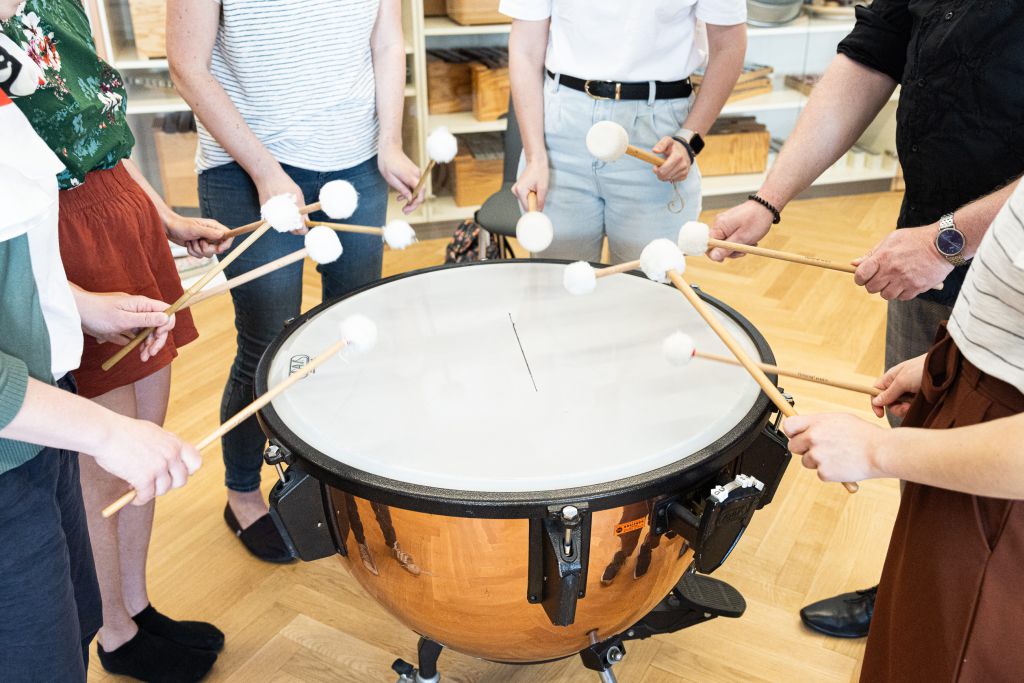Ein Forschungsschwerpunkt am Wiener Zentrum für Musiktherapie-Forschung (WZMF)
Musiktherapeutische Praxis, Forschung und Lehre sind stets in größere Kontexte eingebunden, mit welchen sie in wechselseitiger Beziehung stehen. Dieses Verhältnis kann auf unterschiedlichen Ebenen untersucht werden: Auf der Makroebene sind es gesamtgesellschaftliche Normen und Strukturen, die Einfluss darauf nehmen, wie Musiktherapie konzipiert und praktiziert wird. Auf der Mesoebene treffen in den Institutionen, in denen Musiktherapie praktiziert wird, die Wertesysteme unterschiedlicher Professionen aufeinander. Auf der Mikroebene schließlich werden all diese Einflussfaktoren in der direkten Begegnung von Menschen deutlich: von Therapeut_innen und Klient_innen, aber auch Kolleg_innen in multiprofessionellen Teams.
Diesem Themenspektrum widmet sich ein neu eingerichteter Forschungsschwerpunkt am WZMF. Mit finanzieller Unterstützung des Gender|Queer|Diversität-Call_mdw 2022 der Plattform Gender_mdw wurde im Rahmen einer Lehrveranstaltung, geleitet von Julia Fent, ein öffentliches Symposium im Juni 2023 durchgeführt, das den Auftakt für einen Austausch zwischen Studierenden, Lehrenden, Forschenden und Praktiker_innen aus der Musiktherapie und angrenzenden Bereichen zu den umrissenen Themenfeldern bildete. Allgemeine Grundprinzipien des Forschungsschwerpunkts Musiktherapie und Gesellschaft sind erstens die Verdeutlichung unterschiedlicher epistemologischer Grundannahmen musiktherapeutischen Forschens und resultierender Evidenzbegriffe, zweitens die kritische Reflexion unterschiedlicher Positioniertheiten aller Beteiligten hinsichtlich gesellschaftlicher Machtverhältnisse, drittens der Einbezug organisationaler Faktoren wie etwa verschiedener Wertesysteme im Gesundheitswesen und deren hierarchischer Verhältnisse und viertens die Kooperation und Vernetzung zu relevanten Stakeholder_innen der Gesellschaft.

In verschiedenen Forschungsprojekten am WZMF konkretisiert sich dies unter anderem in den folgenden Fragestellungen:
Welche gesellschaftlichen Normen wirken in der Musiktherapie und wie zeigt sich das?
Die Reflexion dieser Frage soll der (Re-)Produktion stereotyper Zuschreibungen in der eigenen Praxis entgegenwirken. Im aktuellen Forschungsprojekt REFLEaCT (Leitung: Julia Fent) wird der Frage nachgegangen, welche Anforderungen und Potenziale für die Musiktherapie der bewusste Einbezug der gesellschaftlichen Dimension psychischer Probleme (etwa Armut, Diskriminierung, Stigmatisierung) mit sich bringt.
Wie entwickelt sich die berufliche Situation von Musiktherapeut_innen im Verlauf der Zeit?
Das Projekt Musiktherapie-Monitor Österreich (Leitung: Hannah Riedl und Eva Phan Quoc) untersucht alle zwei Jahre mittels Online-Fragebogenerhebung unter Musiktherapeut_innen, wie sich die berufliche Situation, die Arbeitsfelder, die finanzielle Situation u.a. darstellen. So können Veränderungen im Praxisfeld sichtbar und Wechselwirkungen mit gesellschaftlichen Entwicklungen nachvollziehbar gemacht werden.
Wie ist Musiktherapie im Gesundheitssystem verankert und welche ökonomischen und ethischen Fragestellungen ergeben sich daraus?
Trotz gesetzlicher Anerkennung als Gesundheitsberuf ist eine Kassenverrechnung musiktherapeutischer Leistungen im niedergelassenen Bereich bisher nicht möglich, was ungleiche Zugangsmöglichkeiten nach sich zieht. In einem aktuellen PhD-Projekt von Hannah Riedl liegt der Fokus auf dem interdisziplinären Feld „Musiktherapie und Gesundheitsökonomie“ als einer Möglichkeit, sich dieser Thematik anzunähern.
Welche gesellschaftlichen Bedürfnisse kann die Musiktherapie wahrnehmen, um positiv in die Gesellschaft hineinzuwirken?
Gesellschaftspolitisches Engagement kennzeichnet durch die Arbeit mit marginalisierten Personen (z.B. in Psychiatrie oder Sonder- und Heilpädagogik) seit jeher die Wiener Musiktherapie-Tradition. Die Fokussierung auf bisher nur wenig berücksichtigte Zielgruppen und Themenstellungen soll dies fortführen und erweitern. Während der Covid-19-Pandemie führte das WZMF in Kooperation mit dem Institut für Musiksoziologie das präventive Online-Projekt lieblingslied.at (Leitung: Thomas Stegemann) durch. Aktuell werden in SpielRaum schaffen (Leitung: Julia Fent) die gesundheitsfördernden Potenziale von Musiktherapie im Kontext von Wohnungslosigkeit erforscht.
Wie kann musiktherapeutische Forschung möglichst inklusiv gestaltet werden und die Perspektiven von Nutzer_innen angemessen einbinden?
Dies erfordert das Hinterfragen gängiger Wissensbegriffe, wie dies etwa durch partizipative Forschung geschehen kann. Im Rahmen von My Tune (Leitung: Julia Fent und Irene Stepniczka) sowie SpielRaum schaffen werden bzw. wurden Musiktherapie-Nutzer_innen und Praktiker_innen in verschiedener Weise als Co-Forschende eingebunden.
Als weitere Schritte in der Konsolidierung des Forschungsschwerpunkts stehen der Aufbau externer Kooperationen sowie die noch stärkere themenbezogene Vernetzung innerhalb der mdw an. So soll sich das WZMF künftig zu einem Kompetenzzentrum für eine diversitätsreflektierte und machtkritische Musiktherapie im Bewusstsein ihrer gesellschaftlichen Situiertheit entwickeln.

